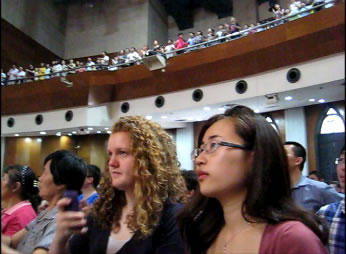On Sunday, May 26, a group of students from Messiah College, their Chinese teacher and I visited a church in Hangzhou, China called chong (respect) yi (one) tang (gathering place). 
Contrary to popular belief (in American minds), this church was anything but "underground." The sanctuary holds 5,000 people and we attended the latter of two services at 10:00 a.m. Nearly every seat was occupied and once when the camera jib swept across the audience, I saw myself smiling at how our group did not blend into the crowd.
We enjoyed the service and tried to sing along even though most of us could not read the characters projected onto the big screens. Despite the language gap, we had little trouble following the musical rendition of the story of Zacchaeus as performed by a visiting choir, most likely because we all were familiar with the biblical account as found in Luke 19, and also because it was styled after American stage musicals. It was, however, the first time that the Chinese students who came with us to the church heard the story of Zacchaeus, the tax collector who was much despised in the West Bank city of Jericho because he had acquired his wealth by dipping into the public coffers.
Perhaps because I had been in China less than one week at the time, a particular accessory employed in the performance stood out to me in the scene in which Zacchaeus repents of his wrongdoing. In order to represent his act of repentance in the Chinese musical version, our small tax collector began to approach members of the cast and hand them 100 yu'an bills, all of which have Chairman Mao's image on them. As soon as I recognized the pinkish red bills that were being handed out, I was struck with the irony of the moment. Here we were in the People's Republic of China, participating in a large Christian gathering, watching an American style musical in which Chairman Mao was an accessory (not to mention that his mini-portrait was in the offering plates too).* I wondered whether the founder of the People's Republic of China would approve of all of this, especially the part about repentance from corruption.
It may well be that Mao Zedong never encountered the story of Zacchaeus, but the people of China are hearing it now and I wanted to discover what their points of access were to this largely unfamiliar New Testament account. So I sought the opinions of the Chinese students, who like us, had just attended a church service for the first time in China. 
As I chatted in English with two of the students during the bus ride back to the university, it was clear that they didn't need us to explain why Zacchaeus was reviled by the people of Jericho. In fact, they understood the effects of corruption all too well because they know something about the ill-gotten wealth of the Chinese superclass (corroborating perhaps what Kwame Appiah argues in Cosmopolitanism, which is that there are value-laden terms that cut across cultures). And who in this world hasn't been incensed by the bureaucrats, financiers and other holders of the purse strings who make approval processes so complex that lay people can barely understand them, while as insiders, they sail through loopholes and "play the system" to their own advantage?
Even though we share a distaste of "corruption," our respective culturally-based attitudes differ in terms of the extent to which we will tolerate it. Bolstered by stories of swashbuckling bounty hunters who chase outlaws in the Wild West and cultural icons like Superman who defend the little guy, common American citizens feel empowered to join in "the never ending battle for truth, justice, and the American way." In China, the tendency is to attempt to solve corruption institutionally; but clearly, more work needs to be done in enforcing standard processes to keep things fair, especially since some of the wealthiest people in China are government officials. Due to the greater transparency of the American system, it is harder for those who are entrusted with the public welfare to illicitly take cookies from the cookie jar without getting their hands slapped. It would not be difficult for Americans come up with examples of public officials who not only lost the public trust, but who also were convicted of fraud or embezzlement and landed in jail. This is almost unheard of in China, unless of course they have a fall out with the Party.
While the broad paths of universal principles serve us well in connecting shared human experiences across cultures, the real cross-cultural challenge is in developing an understanding of how we approach things differently. Now admittedly I was a neophyte in China and on square one, so I had to make some gains in cultural literacy before I could see how the Chinese people were likely to understand the transformation that took place in Zacchaeus' life. Fortunately, one of the teachers at the university in Hangzhou explained the term shang dì to me, and in doing so, handed me a key for understanding the story of Zacchaeus in Chinese terms. Shang dì means "highest emperor," and even though it has been a century since the imperial families were deposed in China, it turns out that decades of communist indoctrination have not snuffed out the people's desire for a benevolent ruler who looks out for them and with whom they are in a relationship of guanxi or interdependency.
While in China, I saw people looking for their benevolent guardian in different places. Some were looking for this connection in the way of the ancients, by burning incense and performing acts of veneration at the Lingyin Temple. The throngs of people I observed filing through the Mao mausoleum in Tiananmen Square seemed to find their benevolent leader in Mao Zedong himself. But the people that I met in Hangzhou helped me see the New Testament story of Zacchaeus in a new light by introducing me to the notions of shang dì and guanxi.
Because encountering different perspectives is part and parcel of what cross cultural exploration is all about, I will bring these comments to a close with a brief narration of the story of Zacchaeus as I see it from my new points of access. As Jesus enters Jericho, he picks our protagonist out of the crowd, and instead of chastising him for taking more than his fair share of the pie, he convivially says, "Zacchaeus, come down immediately. I must stay at your house today." If Jesus had shamed the crooked tax collector in public, there would be a loss of respect for both Zacchaeus and Jesus, since public humiliation is a cultural "no-no" in China. Curiously, instead of shaming him, Jesus honors Zacchaeus by associating with him and establishing guanxi. Although this may seem like a social misstep, the approach of the benevolent prophet brings about a dramatic transformation in his host, who now, very significantly, calls Jesus "Lord."
"Look, Lord!," says Zacchaeus in the only direct dialogue attributed to him in Luke 19. "Here and now I give half of my possessions to the poor, and if I have cheated anybody out of anything, I will pay back four times the amount." This is the joyful, even giddy response of a repentant heart. After establishing a guanxi relationship with his "benevolent Lord," Zacchaeus emerges from his hoarding den ready to live in a more open-handed way, finally able to loosen his grip on the resources.
*Chairman Mao still looms large in China since his portrait and the dates of his lifespan (1893-1976) are printed on ALL of the RMB bills (RMB is the acronym for ren min bi which means "the currency of the people").